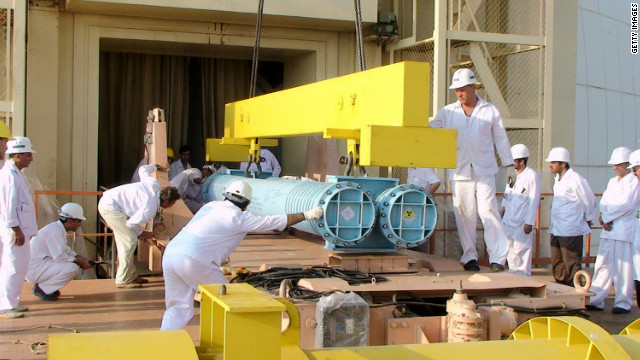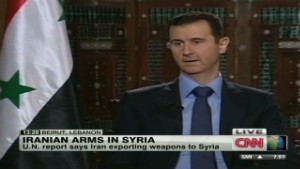U.N. nuclear watchdog expects deal with Iran

- The IAEA's Yukiya Amano held meetings in Iran
- The trip raised speculation about Iran allowing greater access to inspections
- Amano raised the issue of access to the Parchin military complex
(CNN) -- The head of the International Atomic Energy Agency says he will sign an agreement soon with Iran over its nuclear program, a sign that Iran may have agreed to broader inspections.
"I can say it will be signed quite soon," said IAEA Director-General Yukiya Amano, speaking to reporters in Vienna, Austria, on Tuesday after returning from a meeting with Iran's top nuclear negotiator, Saeed Jalili, on Monday. "I cannot say how soon that will be. In a few days, that will be clarified."
The IAEA has been demanding access to sites where Iran could be doing weapons-related testing. The development comes a day before world powers and Iran gather in Baghdad for talks on Iran's nuclear program.
"During the meeting, we discussed a wide spectrum of different issues, including nuclear disarmament, peaceful use of nuclear energy and strengthening (the position of) the agency." Amano said.
 Israel
to Iran: Time is running out
Israel
to Iran: Time is running out  Obama:
G8 unified in approach to Iran
Obama:
G8 unified in approach to Iran  Iran
accused of arming Syria
Iran
accused of arming Syria "During my stay in Tehran, there was an important development on the structured approach document on which we were working since January," he said, adding that a "decision was made by me and Mr Jalili to reach the agreement on the structured approach."
Amano told reporters he raised the issue of access to Parchin, the military complex believed to have been the site of high-explosive tests related to nuclear weapons research.
"This issue will be addressed as part of the implementation of the structured approach document," he said.
Amano said differences remained, but Jalili said they would not pose obstacles to signing the agreement.
The "decision was made to conclude and sign the agreement," Amano said.
The IAEA has been pushing Iran for greater transparency amid growing concerns that the country could be trying to build nuclear weapons, despite its insistence that its nuclear program is for peaceful purposes.
The Baghdad talks come at a critical time for Iran. The country's economy has been crippled by sanctions imposed by the United Nations, the United States and the European Union. And since 80% of Iran's foreign revenues are derived from oil exports, an embargo by the EU set to go into effect in July will put further pressure on its economy.
Iran's state-run Islamic Republic News Agency said that in meetings, both sides "discussed present problems more candidly, providing each other with proposals to remove ambiguities and expand cooperation."
Foreign Minister Ali Akbar Salehi "welcomed the new IAEA approach toward Iran's nuclear issue based on mutual understanding and bilateral respect," IRNA reported Tuesday.
"A balanced approach toward all IAEA member states and defending all of them in the peaceful exploitation of nuclear energy will strengthen the credentiality of this international institution," he said.
Jalili said Iran's "approach opposing nuclear arms provides an important capacity for the IAEA; Iran will have active cooperation with the IAEA in disarmament, campaign against weapons of mass destruction and peaceful use of nuclear energy," IRNA reported Tuesday.
IRNA also said Germany was holding talks with Iran "on likely confidence-building measures" ahead of Wednesday's negotiations in Baghdad.
This week's meeting in Baghdad is a follow-up to last month's talks between Iran and the so-called P5+1: the United States, France, Russia, China, Britain -- the five permanent members of the U.N. Security Council -- plus Germany.
Tensions over Iran's nuclear program have roiled the Middle East, with Iran threatening earlier this year to close the Strait of Hormuz, a vital oil shipping lane, if sanctions were imposed on its exports of crude oil.
Meanwhile, Israel, which is believed to have its own nuclear arsenal, has said it may attack Iran to prevent it from developing nuclear weapons. Prime Minister Benjamin Netanyahu, who has repeatedly raised alarms about Iran's nuclear development, said Monday that the world's leading powers "must show determination, not weakness" in the upcoming talks.
"They do not need to make concessions to Iran," he said in remarks distributed by his office. "They need to set clear and unequivocal demands before it."
Israel wants Iran to halt all uranium enrichment, give up all nuclear fuel it has enriched so far and dismantle the Fordo enrichment plant it built into a mountainside.
"Only thus will it be possible to ensure that Iran will not have a nuclear bomb," Netanyahu said.
The participating heads of state at the NATO summit in Chicago issued a declaration focusing on numerous issues, including Iran.
"We share the United Nations Security Council's serious concern with Iran's nuclear program and call upon Iran to fully comply with all its international obligations," the statement said.
"We further call upon Iran to cooperate with the international community to build confidence in the exclusively peaceful nature of its nuclear program in compliance with its NPT (Nuclear Nonproliferation Treaty) obligations. We support the immediate resolution of the Iranian nuclear issue through diplomatic means and encourage a sustained process of engagement within the format of the P5+1 and Iran talks."
Leaders of the so-called Group of Eight -- the United States, Canada, the United Kingdom, Germany, France, Italy, Japan and Russia -- called Saturday on Iran to comply with the requirements of the IAEA and open its doors to nuclear inspectors.
In a declaration, the G8 leaders said they welcomed the resumption of talks.
The leaders called on Iran to engage "in detailed discussion about near-term, concrete steps that can, through a step-by-step approach based on reciprocity, lead towards a comprehensive negotiated solution which restores international confidence that Iran's nuclear program is exclusively peaceful," according to the declaration.
The G8 leaders also urged Iran to comply with international obligations to uphold human rights and fundamental freedoms, including the freedom of religion.
CNN's Reza Sayah contributed to this report.
 ©
2012 Cable News Network.
Turner
Broadcasting System, Inc. All Rights Reserved. To subscribe or visit
go to: http://www.cnn.com
©
2012 Cable News Network.
Turner
Broadcasting System, Inc. All Rights Reserved. To subscribe or visit
go to: http://www.cnn.com